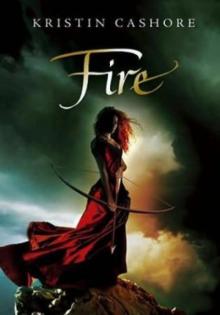- Home
- Kristin Cashore
Fire skt-2 Page 10
Fire skt-2 Read online
Page 10
Archer spluttered. Before he could speak she swung to him and looked up into his eyes. Don't quarrel with me in front of the king's brother, she thought to him. And don't ruin this two months' peace.
He glared back at her. "I'm not the one who ruins it," he said, his voice low.
Brocker was accustomed to this; but how must they look to Brigan, staring at each other, having one side of an argument? I won't do this now. You may embarrass yourself, but you will not embarrass me.
Archer drew in a breath that sounded like a hiss, turned on his heel, and stormed out of the room. He slammed the door, leaving an uncomfortable silence in his wake.
Fire touched a hand to her headscarf and turned back to Brigan. "Please forgive our rudeness," she said.
Not a flicker in those grey eyes. "Of course."
"How will you ensure her safety on the journey, Commander?" Brocker asked quietly. Brigan turned to him, then sat in a chair, resting his elbows on his knees; and his whole manner seemed to change. With Brocker he was suddenly easy and comfortable and respectful, a young military commander addressing a man who could be his mentor.
"Sir, we'll ride to King's City in the company of the entire First Branch. They're stationed just west of here."
Brocker smiled. "You misunderstand me, son. How will you ensure she'll be safe from the First Branch? In a force of five thousand there'll be some with the mind to hurt her."
Brigan nodded. "I've hand-picked a guard of twenty soldiers who can be trusted to care for her."
Fire crossed her arms and bit down hard. "I don't need to be cared for. I can defend myself."
"I don't doubt it, Lady," Brigan said mildly, looking into his hands, "but if you're to ride with us you'll have a guard nonetheless. I can't transport a civilian female in a party of five thousand men on a journey of nearly three weeks and not provide a guard. I trust you to see the sense in it."
He was talking around the fact that she was a monster who provoked all the worst kinds of behaviour. And now that her temper was done flaring, she did see the sense in it. Truly, she'd never pitted herself against five thousand men before. She sat down. "Very well."
Brocker chuckled. "If only Archer were here to see the powers of rational argument."
Fire snorted. Archer wouldn't consider her allowance of the guard to be evidence of the powers of rational argument. He'd take it as proof that she was in love with whichever of her guards was most handsome.
She stood up again. "I'll ready myself," she said, "and ask Donal to ready Small."
Brigan stood with her, his face closed again, impassive. "Very good, Lady."
"Will you wait here with me, Commander?" Brocker said. "I've a thing or two to tell you."
Fire scrutinised Brocker. Oh? What do you need to tell him?
Brocker had too much class for a one-sided argument. He also possessed a mind so clear and strong that he could open a feeling to her with perfect precision, so that it came to her practically as a sentence. I want to give him military advice, Brocker thought to her.
Mildly reassured, Fire left them.
When she got to her bedroom Archer was sitting in a chair against the wall. Taking a liberty with his presence, for it wasn't his room to enter without invitation. But she forgave him. Archer couldn't abandon the responsibilities of his house and farms so suddenly in order to travel with her. He would stay behind, and they would be a long time apart – almost six weeks to get there and back, and longer if she stayed any time in King's City.
When Brocker had asked her, in her fourteenth year, just how much power she had over Cansrel's mind when she was inside it, Archer had been the one to defend her. "Where's your heart, Father? The man is her father. Don't make her relationship with him more difficult than it already is."
"I'm only asking questions," Brocker had responded. "Does she have the power to shift his attitudes? Could she change his ambitions permanently?"
"Anyone can see these are not idle questions."
"They're necessary questions," Brocker had said, "though I wish they were not."
"I don't care. Leave her be," Archer had said, so passionately that Brocker had let her be, at least for the moment.
Fire supposed she would miss Archer defending her on this trip. Not because she wanted his defence, but simply because it was what Archer did when he was near.
She unearthed her saddlebags from a pile at the bottom of her closet and began to fold underclothing and riding gear into them. There was no point in bothering with dresses. No one ever noticed what she wore, and after three weeks in her bags they would be unwearable anyway.
"You'll desert your students?" Archer said finally, leaning over his knees, watching her pack. "Just like that?"
She turned her back to him on the pretense of searching for her fiddle, and smiled. He had never been quite so concerned for her students before.
"You didn't take long to decide," he added.
She spoke simply; to her it was obvious. "I've never seen King's City."
"It's not so wonderful as all that."
It was a thing she'd like to determine for herself. She dug through the piles on her bed and said nothing.
"It'll be more dangerous than any place you've ever been," he said.
"Your father took you away from that place because you weren't safe there."
She set her fiddle case beside her saddlebags. "Shall I choose a life of bleakness, then, Archer, just to stay alive? I won't hide in a room with the doors and windows shut. That is not a life."
He ran his finger against the ridge of a feather in the quiver beside him. He glowered at the floor, chin on fist. "You'll fall in love with the king."
She sat on the edge of the bed facing him, and grinned. "I couldn't fall in love with the king. He's weak-minded and he drinks too much wine."
He caught her eye. "And? I'm jealous-minded and I sleep with too many women."
Fire's smile grew. "Luckily for you, I loved you long before you became either of those things."
"But you don't love me as much as I love you," he said. "Which is what's made me this way."
This was harsh, coming from a friend she would lose her life for. And harsh that he would say such a thing right when she was about to leave for so long. She stood and turned her back to him. Love doesn't measure that way, she thought to him. And you may blame me for your feelings, but it isn't fair to blame me for how you've chosen to behave.
"I'm sorry," he said. "You're right. Forgive me, Fire."
And she forgave him again, easily, because she knew that his anger usually fizzled as quickly as it came, and behind it his heart was full to bursting. But she stopped at forgiveness. She could guess what Archer wanted, here in her bedroom before she departed, and she wasn't going to give it to him.
It had been easy once, taking Archer into her bed; not so long ago it had been simple. And then, somehow, the balance had tipped between them. The marriage proposals, the lovesickness. More and more, the simplest thing was to say no.
She would answer him gently. She turned to him and held out her hand. He stood and came to her.
"I must change into riding clothes and pull a few more things together," she said. "We'll say our goodbyes now. You must go down and tell the prince I'm coming."
He stared at his shoes and then into her face, understanding her. He tugged at her headscarf until it slid away and her hair fell around her shoulders. He collected her hair in one hand, bent his face to it, kissed it. He pulled Fire to him and kissed her neck and her mouth, so that her body was left wishing that her mind were not so stingy. Then he broke away and turned to the door, his face the picture of unhappiness.
Chapter Ten
She had been afraid the army would move too fast for her or that every one of the five thousand soldiers would have to slow down for her sake. And the army did ride fast above ground, when the land underfoot was smooth enough to allow it, but most of the time the pace was more moderate. It was partly the restrictions o
f tunnels and terrain and partly the objectives of an armed force, which by nature seeks out the very troubles that other travelling parties hope to avoid.
The First Branch was a wonder of organisation: a moving base divided into sections, divided again into small units that broke off periodically, sped to a gallop, disappeared into caves or up mountain paths, and reappeared some time later. Scout units rode fast ahead of them and patrol units to every side, and they sent subunits racing back sometimes to make reports, or in the case of trouble found, request support. Sometimes, the soldiers who returned were bloody and bruised, and Fire came to recognise the green tunics of the healer units that rushed to their aid.
Then there were the hunting units which moved in rotation, circling back now and then with their game. There were the supply units, which handled the pack horses and figured the inventories. The command units delivered messages from Brigan to the rest of the force. The archery units kept eyes open for animal and monster predators foolish enough to prey on the main column of riders. Fire's own guard was a unit, too. It created a barrier between her and the thousands as she rode, and assisted her with everything she needed, which at first consisted mainly of answers to her questions about why half the army seemed always to be coming or going.
"Is there a unit to keep track of all the other units?" she asked the leader of her guards, the hazel-eyed woman, whose name was Musa.
Musa laughed. Most of Fire's questions seemed to make Musa laugh. "The commander doesn't use one, Lady. He keeps track in his head. Watch the traffic around the standard-bearer – every unit that comes or goes reports first to the commander."
Fire had been watching the standard-bearer – and his horse – with considerable sympathy, actually, because he seemed to ride twice as far as most of the rest of the army. The standard-bearer's sole charge was to stay near the commander so that the commander could always be found; and the commander was forever doubling back, breaking off, bursting forward, depending, Fire assumed, on matters of great military import, whatever in the Dells that meant. The standard-bearer always turning circles with him, chosen for that duty, Fire supposed, because he was a fine horseman.
Then the prince and the standard-bearer came closer, and once again Fire corrected herself. A fine horsewoman.
"Musa, how many women are in the First Branch?"
"Some five hundred, Lady. Perhaps twenty-five hundred in all four branches and the auxiliaries together."
"Where are the auxiliaries when the rest of the army is patrolling? "
"In the forts and signal stations spread throughout the kingdom, Lady. Some of the soldiers manning those posts are women."
Twenty-five hundred women who had volunteered to live on a horse's back, and fight, and eat, dress, sleep in a mob of males. Why would a woman choose such a life? Were their natures wild and violent, as some of the men had already proven theirs to be?
When she and her entourage had first passed out of Trilling's woods onto the rocky flats where the army was stationed, there had been a single fight over Fire, short and brutal. Two men out of their minds at the sight of her and disagreeing on some point (her honour, their respective chances), enough for shoves, fists to the face, broken noses, blood. Brigan was down from his horse with three of Fire's guard before Fire had fully comprehended what was happening. And one crisp word from Brigan's mouth had ended it: "Enough."
Fire had kept her eyes on Small's shoulders, combing his mane with her fingers until a sense of remorse had trickled to her from the minds of both fighters. Then she'd allowed herself a surprised peek at their hanging heads, their doleful glances at Brigan, blood plopping from broken lips and noses onto the ground. They'd forgotten her. She'd sensed that clearly. In their shame before their commander, they'd forgotten all about her.
Unusual. Fire's eyes had flicked curiously to Brigan. His expression had been cool, his mind unreadable. He'd spoken to the fighters quietly, hadn't looked at her once.
Back onto their horses, and shortly thereafter word had come around from the command units that any soldier brawling over any matter relating to the Lady Fire would find himself out of the army and the army's favour, disarmed, discharged, and sent home. Fire gathered from the low whistles and high eyebrows among her guard that it was a harsh punishment for brawling.
She didn't know enough about armies to extrapolate. Did a harsh punishment make Brigan a harsh commander? Was harshness the same as cruelty? Was cruelty the source of Brigan's power over his soldiers?
And where was the hardship in discharge from a fighting force in a time of impending war? To Fire it sounded more like a reprieve.
Fire pictured Archer riding through his fields at day's end, stopping to talk with the farmers, laughing, cursing the stubborn rocky ground of the north, as he always did. Archer and Brocker sitting down to dinner without her.
When the army finally stopped for the night she insisted on currying her own horse. She leaned into Small and whispered to him, comforted herself with the feel of him, the only familiar heart in a sea of strangers.
They made camp in a gigantic underground cavern, halfway between Fire's home and Roen's fortress, the likes of which Fire had never seen. Nor could she particularly see it now, for it was dim, light glancing through cracks in the ceiling and seeping from side openings. As the sun set, the cavern turned positively dark, and the First Branch was a composition of moving shadows spread across the sloping floor of the chamber.
Sound in the cavern was thick, musical. When the commander had left the camp with a force of two hundred, two hundred had echoed like two thousand and the footfalls had chimed like bells all around her. He'd taken off just as soon as he'd seen everyone settled – his face as indecipherable as ever. A scout unit of fifty soldiers had not returned at the time and place it was meant to. He'd gone looking for it.
Fire was uneasy. The shifting shadows of her five thousand companions unsettled her. Her guard kept her apart from most of these soldiers, but she could not separate herself from the impressions she collected in her mind. It was exhausting, to keep track of so many. They were most of them aware of her on some level, even those farthest away. Too many of them wanted something from her. Some got too close.
"I like the taste of monster," one with a twice broken nose hissed at her.
"I love you. You're beautiful," another three or four breathed to her, seeking her out, pressing themselves against the barriers of her guard to reach her.
Brigan had given her guard strict orders before he'd ridden away. The lady was to be housed in a tent even though the army was under a cavern's roof, and two of her female guard were to accompany her always inside the tent.
"Am I never to have privacy?" she'd put in, overhearing Brigan's order to Musa.
Brigan had taken a leather gauntlet from a young man Fire supposed was his squire, and pulled it over his hand. "No," he'd said. "Never." And before she'd even been able to take a breath to protest he'd pulled on his other gauntlet and called for his horse. The hoof-beat music had swelled, and then dissipated.
In her tent the smell of roasting monster meat came to her. She crossed her arms and tried not to glare at her two female guard companions, whose names she couldn't remember. She tugged at her headscarf. Surely in the presence of these women she could have some relief from the tight wrapping around her hair. They didn't want anything from her; the strongest emotion she could sense from both of them was boredom.
Of course, once she'd uncovered her hair their boredom lessened. They watched her with curious eyes. She looked back wearily. "I forget your names. I'm sorry."
"Margo, Lady," said the one with a broad, pleasant face.
"Mila, Lady," said the other, delicate boned, light haired, and very young.
Musa, Margo, and Mila. Fire bit off a sigh. She recognised the feel of almost every one of her twenty guards at this point, but the names would take her some time.
She didn't know what else to say, so she fingered the case of her fiddle. She ope
ned the case and inhaled the warm smell of varnish. She plucked a string and the answering acoustics, like the reverberation of a bell struck underwater, focused her disorientation. The flap of the tent was open and the tent itself was set in a niche against the side of the cavern, a low, curving roof curling above it, not unlike the shell of an instrument. She tucked the fiddle under her chin and tuned it, and then, very quietly, she began to play.
A lullaby, soothing, to calm her own nerves. The army faded away.
Sleep didn't come easily that night, but she knew it would be pointless to seek out the stars. Rain seeped through cracks in the ceiling and trickled down the walls to the floor; the sky tonight would be black. Perhaps a midnight storm would batter away her dreams. She threw back her blanket, found her boots, slipped past the sleeping forms of Margo and Mila, and pushed open the tent flap.
Outside she took care not to trip over the other sleeping guards, who were arranged around her tent like some kind of human moat. Four of the guards were awake: Musa and three men whose names she couldn't remember. They played cards in the light of a candle. Candles flickered here and there all across the floor of the cavern. Fire supposed that most units kept some kind of watch throughout the night. She pitied the soldiers currently on guard outside this haven, in the rain. And Brigan's search party, and the scouts for whom they searched, all of whom had yet to return.
The four guards seemed a bit dazed at the sight of her. She touched her hand to her hair, remembering that it was unbound.
Musa recollected herself. "Is anything wrong, Lady?"
"Is there an opening in this cavern to the sky?" Fire asked. "I want to see the rain."
"There is," Musa said.
"Will you show me the way?"
Musa set her cards down and began to wake the guards at the furthest edges of the human moat.
"What are you doing?" Fire whispered. "Musa, it's not necessary. Please. Let them sleep," she said, but Musa continued to shake shoulders until four of the men were awake. She ordered two of the card players to sit and keep watch. She motioned for the others to arm themselves.

 Graceling
Graceling Bitterblue
Bitterblue Fire
Fire Winterkeep
Winterkeep Helen Keller in Love
Helen Keller in Love Bitterblue skt-3
Bitterblue skt-3 Fire skt-2
Fire skt-2 Graceling skt-1
Graceling skt-1